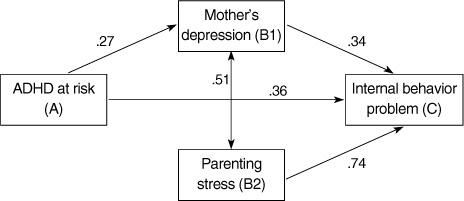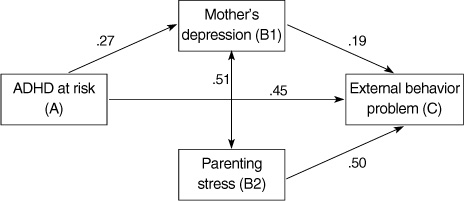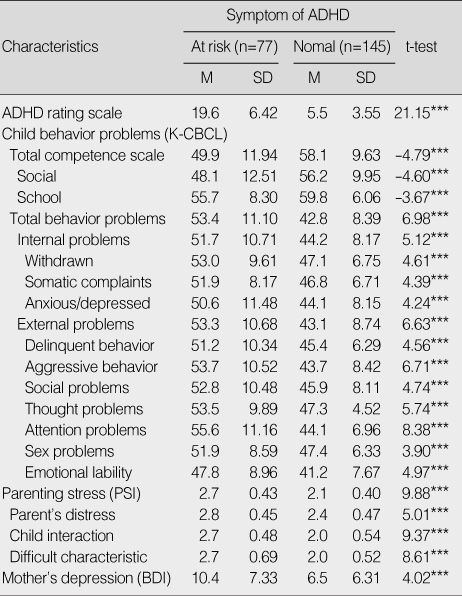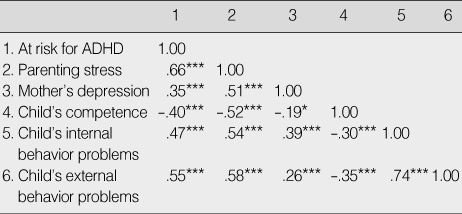Articles
- Page Path
- HOME > J Korean Acad Nurs > Volume 40(3); 2010 > Article
-
Original Article
- Analysis of Relationships between Parenting Stress, Maternal Depression, and Behavioral Problems in Children at Risk for Attention Deficit Hyperactive Disorder
- Hee Sun Shin, Jeong Mee Kim
-
Journal of Korean Academy of Nursing 2010;40(3):453-461.
DOI: https://doi.org/10.4040/jkan.2010.40.3.453
Published online: June 30, 2010
1Researcher, The Environmental Health Center, Dankook University Medical Center · Professor, Department of Nursing, Dankook University, Cheonan, Korea.
2Assistant Professor, Department of Social Welfare, Baekseok Arts University, Seoul, Korea.
- Address reprint requests to: Shin, Hee Sun. Department of Nursing, Dankook University, 29 Anseo-dong, Cheonan 330-714, Korea. Tel: 82-41-550-3882, Fax: 82-41-550-3888, sw724@dankook.ac.kr
Copyright © 2010 Korean Society of Nursing Science
Abstract
-
Purpose
- In this study differences in behavioral problems between children at risk for Attention Deficit Hyperactive Disorder (ADHD) and normally developing children were identified. Further, relationships between parental stress, depression, and child behavioral problems according to ADHD symptoms were explored.
-
Methods
- Participants were 222 elementary school children and their parents. The ADHD risk group was determined by the Korean-ADHD Rating Scale. Data were collected using the Korean-ADHD Rating Scale, Korean version of Child Behavior CheckList (K-CBCL), Parenting Stress Index, and Beck Depression Inventory. Data were analyzed using t-test, Pearson correlation coefficients, and regression analysis.
-
Results
- 1) The ADHD risk group showed higher levels of behavioral problems, parenting stress, and maternal depression than the normal group. 2) There were significant relationships between ADHD scores and parenting stress (r=.66), maternal depression (r=.35), internal behavioral problems (r=.47), and external problems (r=.55), but, ADHD risk scores were negatively correlated with social competence (r=-.40). 3) The regression analysis revealed that ADHD levels affected the child's internal behavioral problems, mediated by maternal depression (β=.29, p<.001).
-
Conclusion
- The study results show that higher risk scores for ADHD indicate a significant effect for behavioral problems. Also, parenting stress and depression influence child's behavioral problems. These results suggest that identification of children at risk for ADHD and development of parental education programs would contribute to the prevention of behavioral problems and aggravation of the ADHD symptoms.
This work was supported by a Korea Research Foundation Grant funded by the Korean Government (KRF-2008-E00162).
- 1. American Psychiatric Association. Diagnostic and statistical manual of mental disorders. 1994;4th ed. Washington, DC, American Psychiatric Press.
- 2. Baron MA, Kenny D. The moderator-mediator variable distinction in social psychological research. Journal of Personality and Social Psychology. 1986;51:1173–1182.ArticlePubMed
- 3. Cho S, Kim B, Kim J, Rohde LA, Hwang J, Chungh D, et al. Full syndrome and subthreshold attention-deficit/hyperactivity disorder in a Korean community sample: Comorbidity and temperament findings. European Child and Adolescent Psychiatry. 2009;18:447–457.ArticlePubMedPDF
- 4. Cho SC. Attention-deficit and hyperactive disorder. 2001;Seoul, Seoul National University Publishing.
- 5. Choi MR. The moderating and mediating effects of self-esteem on the relationship between life stress and depression. 2000;Seoul, Chung-Ang University. Unpublished doctoral dissertation.
- 6. Choi Y, Kim J, Cho S, Hong S, Oh E. The effect of ADHD child mother's depressive mood, parenting stress, and parenting related attitude on parenting behavior. Journal of Child & Adolescent Psychiatry. 2002;13:153–162.
- 7. Daley D. Attention deficit hyperactive disorder: A review of the essential facts. Child: Care, Health & development. 2006;32:193–204.
- 8. Derks EM, Hudziak JJ, Dolan CV, Ferdinand RF, Boomsma DI. The relations between DISC-IV DSM diagnoses of ADHD and multi-informant CBCL-AP syndrome scores. Comprehensive Psychiatry. 2006;47:116–122.ArticlePubMed
- 9. Froehlich TE, Lanphear BP, Epstein JN, Barbaresi WJ, Katusic SK, Kahn RS. Prevalence, recognition, and treatment of attention-deficit/hyperactivity disorder in a national sample of US children. Archives of Pediatric and Adolescence Medicine. 2007;161:857–864.Article
- 10. Gonzalez LO, Sellers EW. The effects of a stress-management program on self-concept, locus of control, and the acquisition of coping skills in school-age children diagnosed with attention deficit hyperactivity disorder. Journal of Child and Adolescent Psychiatric Nursing. 2002;15:5–15.ArticlePubMed
- 11. Harrison C, Sofronoff K. ADHD and parental psychological distress: Role of demographics, child behavioral characteristics, and parental cognitions. Journal of the American Academy of Child and Adolescent Psychiatry. 2002;41:703–711.ArticlePubMed
- 12. Johnston C, Mash EJ. Families of children with attention-deficit/hyperactivity disorder: Review and recommendations for future research. Clinical Child and Family Psychology Review. 2001;4:183–207.PubMed
- 13. Kendall J, Shelton K. A typology of management styles in families with children with ADHD. Journal of Family Nursing. 2003;9:257–280.ArticlePDF
- 14. Kim EJ, Kwon HJ. Report about prevalence of ADHD in children. Endocrine disruptive substance and children's health. 2008;In: Symposium conducted at the meeting of First Academic Symposium of Environmental Health Center; Dankook University Medical Center.
- 15. Kim EY. The path analysis of the relationship of maternal parenting stress, parenting efficacy and dysfunctional discipline practice to child's adjust problems. 2005;Seoul, Ewha Womans University. Unpublished master's thesis.
- 16. Larsson JO, Larsson H, Lichtenstein P. Genetic and environmental contributions to stability and change of ADHD symptoms between 8 and 13 years of age: A longitudinal twin study. Journal of the American Academy of Child and Adolescent Psychiatry. 2004;43:1267–1275.ArticlePubMed
- 17. Lee Y, Song W, Choi Y, Shin Y. The relationship among child's behavior problems, maternal depression, and parenting stress. Journal of Child & Adolescent Psychiatry. 2003;14:218–228.
- 18. Lee YJ. The relations between mothers depression, parenting stress, and children's behavior problems. 2006;Seoul, Seoul Woman's University. Unpublished masters thesis.
- 19. Lin Y, Chung H. Parenting stress and parent's willingness to accept treatment in relation to behavioral problems of children with attention-deficit hyperactive disorder. Journal of Nursing Research. 2002;10:43–56.Article
- 20. Luteijin EF, Serra M, Jackson S, Steenhuis MP, Althaus M, Volkmar F, et al. How unspecified are disorders of children with a pervasive developmental disorder not otherwise specified? European Child & Adolescent Psychiatry. 2000;9:168–179.ArticlePDF
- 21. Oh K, Ha E, Lee H, Hong K. Korea child behavior checklist. 2007;Seoul, HUNO Counsulting.
- 22. Oh WO. Factor influencing family quality of life among mothers of children with ADHD. Journal of Korean Academy of Child Health Nursing. 2008;14:396–404.
- 23. Oh WO, Park ES. Parenting experience of parents of children with ADHD. Journal of Korean Academy of Nursing. 2007;37:91–104.PubMed
- 24. Park J, Lee K, Shin Y. Effects of mother-child relationship and mother's parenting stress on preschoolers' behavior problems. Korean Journal of Woman Psychology. 2009;14:549–566.Article
- 25. Park HS, Choi EJ. The difference of temperament, goodness of fit and behavioral problems in ADHD subtypes of adolescent high risk group. Journal of Child & Adolescent Psychiatry. 2005;16:106–116.
- 26. Sayal K, Hornsey H, Warren S, MacDiarmid F, Taylor E. Identification of children at risk of attention deficit/hyperactive disorder: A school-based intervention. Social Psychiatry and Psychiatric Epidemiology. 2006;41:806–813.PubMed
- 27. Seo M, Chang E, Jung C, Chei S. The study of the parenting stress, depression and parenting efficacy on the mother of attention deficit hyperactivity disorder children. Korean Journal of Woman Psychology. 2003;8:69–81.
- 28. Shin SJ. The influence of parenting stress, social support, and mother's efficacy on mother's rearing behavior. 1997;Seoul, Yonsei University. Unpublished doctoral dissertation.
- 29. So YK, Noh JS, Kim YS, Ko SG, Koh YJ. The reliability and validity of Korean parent and teacher ADHD rating scale. Journal of Korean Neuropsychiatric Association. 2002;41:283–289.
- 30. Sonuga-Barke EJS, Daley D, Thompson M, Weeks A, Laver-bradbury C. Parent based therapies for preschool attention deficit/hyperactivity disorder: A randomized controlled trial with a community sample. Journal of the American Academy of Child and Adolescent Psychiatry. 2001;40:402–408.ArticlePubMed
REFERENCES
Figure & Data
REFERENCES
Citations

- The Effect of Happiness Training Based on Fordyce Model on Perceived Stress in the Mothers of Children with Cleft Lip and Palate
Zeinab Hemati, Samira Abbasi, Somayeh Paki, Davood Kiani
Journal of Caring Sciences.2017; 6(2): 173. CrossRef - Related Factors for Behavioral Problems in Toddlers Born Prematurely
Youngmee Ahn, Sangmi Lee
Child Health Nursing Research.2016; 22(1): 45. CrossRef - Relationships between behavioral symptoms of non‐medicated Chinese children with attention deficit hyperactivity disorder and parenting stress: Comparison of different subtypes and comorbidities
Yan Li, Wen‐Qing Jiang, Ya‐Song Du, David Coghill
Asia-Pacific Psychiatry.2016; 8(2): 127. CrossRef - A Short-Term Longitudinal Study on the Reciprocal Relations between Mothers’ Depression and Their Preschoolers’ Emotional Problems
Young Eun Chang, Hyo Jeong Han
Family and Environment Research.2016; 54(5): 551. CrossRef - Stress levels experienced by parents of children with and without attention-deficit/hyperactivity disorder during the back-to-school period: results of a European and Canadian survey
Isabel Hernández-Otero, Lakshman Doddamani, Benoit Dutray, Antonella Gagliano, Fabian Haertling, Ralph Bloomfield, Gracita Ramnath
International Journal of Psychiatry in Clinical Practice.2015; 19(1): 8. CrossRef - Methylphenidate‐osmotic‐controlled release oral delivery system treatment reduces parenting stress in parents of children and adolescents with attention‐deficit/hyperactivity disorder
Jun‐Won Hwang, Bongseog Kim, Yeni Kim, Tae‐Ho Kim, Wan‐Seok Seo, Dong‐Won Shin, Young‐Jae Woo, Heejeong Yoo, Jeong‐Seop Lee, Jong‐Hun Lee, Myung‐Ho Lim, Young‐Chul Chung, Chul‐Ho Jung, Hanik K. Yoo
Human Psychopharmacology: Clinical and Experimental.2013; 28(6): 600. CrossRef - Effects of a Responsive Parenting Education Program on Child's Behavioral Problems and Pivotal Developmental Behaviors in Children at Risk for Attention Deficit Hyperactivity Disorder
Hee-Sun Shin, Jeong-Mee Kim
Journal of Korean Academy of Child Health Nursing.2011; 17(1): 39. CrossRef - Teaching Status and Knowledge of Elementary School Teachers of Children with Attention Deficit Hyperactivity Disorder
Kyoung-Rim Kang, Young-Hae Kim, Young-Ok Yang
Journal of Korean Academy of Child Health Nursing.2011; 17(2): 136. CrossRef - Relationship of Mothers' Recognition of Attention Deficit Hyperactivity Disorder (ADHD), Parenting Stress and Family Support in Children Diagnosed with ADHD
Mi-Ye Kim, Ji-Yeong Seo, Wan-Ju Park
Journal of Korean Academy of Child Health Nursing.2011; 17(2): 127. CrossRef - Effects of Postpartum Depression and Temperament of Infant on Child-care Stress among Mothers of Newborn Infants
Hye-Jin Kwon, Kyung-Hee Kim, Mi-Hye Choi, Ju-Yeon Cho, Young-Mi Ahn, Ki-Sook Kim
Journal of Korean Academy of Child Health Nursing.2011; 17(2): 69. CrossRef


Figure 1
Figure 2
Comparison of the Characteristics of Children and Mothers for the Two Groups (N=222)
***p≤.001.
Correlation among Variables
***p≤.001; **p<.010; *p<.050.
Mediation Effect of Mother's Depression on the Influence of the Symptom of ADHD on Child's Internal Behavior
***p<.001.
Mediation Effect of Mother's Depression on the Influence of the Symptom of ADHD on Child's External Behavior
***p<.001.
***
***
***
***
 KSNS
KSNS
 E-SUBMISSION
E-SUBMISSION






 Cite
Cite

